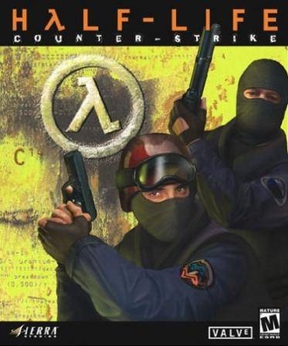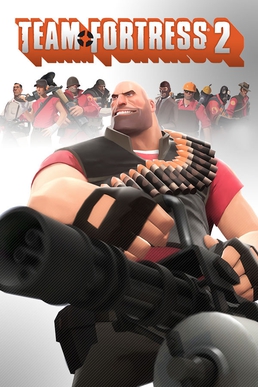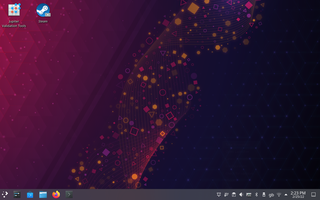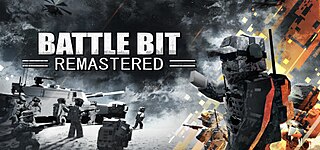
Counter-Strike is a tactical first-person shooter game developed by Valve. It was initially developed and released as a Half-Life modification by Minh "Gooseman" Le and Jess Cliffe in 1999, before Le and Cliffe were hired and the game's intellectual property acquired. Counter-Strike was released by Valve for Microsoft Windows in November 2000, and is the first installment in the Counter-Strike series. Several remakes and ports were released on Xbox, as well as OS X and Linux.

PunkBuster is a computer program that is designed to detect software used for cheating in online games. It does this by scanning the memory contents of the local machine. A computer identified as using cheats may be banned from connecting to protected servers. The aim of the program is to isolate cheaters and prevent them from disrupting legitimate games. PunkBuster is developed and published by Even Balance, Inc.

Steam is a video game digital distribution service and storefront managed by Valve Corporation. It was launched as a software client in September 2003 to provide game updates automatically for Valve's games and expanded to distributing third-party titles in late 2005. Steam offers various features, like game server matchmaking with Valve Anti-Cheat (VAC) measures, social networking, and game streaming services. Steam client's functionality include game update automation, cloud storage for game progress, and community features such as direct messaging, in-game overlay and a virtual collectable marketplace.

Team Fortress 2 (TF2) is a multiplayer first-person shooter game developed and published by Valve Corporation in 2007. It is the sequel to the 1996 Team Fortress mod for Quake and its 1999 remake, Team Fortress Classic. The game was released in October 2007 as part of The Orange Box for Microsoft Windows and the Xbox 360, and was ported to the PlayStation 3 in December 2007. It was released as a standalone game for Windows in April 2008, and updated to support macOS in June 2010 and Linux in February 2013. It was made free-to-play in June 2011, and is distributed online through Valve's digital retailer, Steam.

Valve Anti-Cheat (VAC) is an anti-cheat tool developed by Valve as a component of the Steam platform, first released with Counter-Strike in 2002.

Feral Interactive Limited is a British video games developer and publisher for macOS, Linux, iOS, Android, Nintendo Switch and Microsoft Windows platforms. It was founded in 1996 to bring games to Mac and specialises in porting games to different platforms.

SteamOS is a Linux distribution developed by Valve. It incorporates Valve's popular namesake Steam video game storefront and is the primary operating system for the Steam Deck, Valve's portable gaming device, as well as Valve's earlier Steam Machines. SteamOS is open source with some closed source components.
Early access, also known as alpha access, alpha founding, paid alpha, or game preview, is a funding model in the video game industry by which consumers can purchase and play a game in the various pre-release development cycles, such as pre-alpha, alpha, and/or beta, while the developer is able to use those funds to continue further development on the game. Those that pay to participate typically help to debug the game, provide feedback and suggestions, may have access to special materials in the game. The early-access approach is a common way to obtain funding for indie games, and may also be used along with other funding mechanisms, including crowdfunding. Many crowdfunding projects promise to offer access to alpha and/or beta versions of the game as development progresses; however, unlike some of these projects which solicit funds but do not yet have a playable game, all early access games offer an immediately playable version of the unfinished game to players.

The Culling is a first-person action battle royale game developed and published by Xaviant. Following an early access beta phase, the game was released for Linux, Microsoft Windows, and Xbox One on October 5, 2017.
In video games, skin gambling is the use of virtual goods, often cosmetic in-game items such as "skins", as virtual currency to bet on the outcome of professional matches or on other games of chance. It is commonly associated with the community surrounding Counter-Strike 2, but the practice exists in other games such as Electronic Arts's FIFA. Valve, the developer of the Counter-Strike series, also runs the Steam marketplace which can be interfaced by third-parties to enable trading, buying, and selling of skins from players' Steam inventories for real-world or digital currency. Valve condemns the gambling practices as it violates the platform's terms of service.

Escape from Tarkov is a multiplayer tactical first-person shooter video game in development by Battlestate Games for Microsoft Windows. The game is set in the fictional Norvinsk region in northwestern Russia, where a war is taking place between two private military companies. Players join matches called "raids" in which they fight other players and bots for loot and aim to survive and escape.

PUBG: Battlegrounds is a 2017 battle royale video game published by Krafton, and developed by Krafton's PUBG Studios. The game, which was inspired by the Japanese film Battle Royale (2000), is based on previous mods created by Brendan "PlayerUnknown" Greene for other games, and expanded into a standalone game under Greene's creative direction. Played from either a third-person or first-person perspective, up to one hundred players parachute onto an island where they are tasked to scavenge for weapons and equipment to kill other players while avoiding getting killed themselves. The available safe area of the game's map decreases in size over time, directing surviving players into an ever-tightening space to force encounters.
A battle royale game is an online multiplayer video game genre that blends last-man-standing gameplay with the survival, exploration and scavenging elements of a survival game. Battle royale games involve dozens to hundreds of players, who start with minimal equipment and then must eliminate all other opponents while avoiding being trapped outside a shrinking "safe area", with the winner being the last player or team alive.

Brendan Greene, better known as PlayerUnknown, is an Irish video game developer. He is best known for his work on PUBG: Battlegrounds. He left active development on the game to form PUBG Special Projects and PlayerUnknown Productions in March 2019.

Proton is a compatibility layer for Windows games to run on Linux-based operating systems. Proton is developed by Valve in cooperation with developers from CodeWeavers. It is a collection of software and libraries combined with a patched version of Wine to improve performance and compatibility with Windows games. Proton is designed for integration into the Steam client as "Steam Play". It is officially distributed through the client, although third-party forks can be manually installed.

The Steam Deck is a handheld gaming computer produced by Valve, designed to run the large library of games available on the Steam storefront client. Built upon the experiences gained from Valve's earlier ventures with Steam Machine and the Steam Controller, the Steam Deck integrates a custom AMD APU and SteamOS 3.0, a Linux-based operating system. The Steam Deck represents Valve's pivot towards a fully internal hardware development approach, following the challenges faced with Steam Machines' reliance on external manufacturers and the requirement for native Linux game support.

PUBG Mobile is a free-to-play battle royale video game co-developed by LightSpeed & Quantum Studio and PUBG Studios. It is a mobile game adaptation of PUBG: Battlegrounds. It was initially released for Android and iOS on 19th of March 2018.

BattleBit Remastered is a massively multiplayer online first-person shooter developed by a team of three indie developers—SgtOkiDoki, Vilaskis, and TheLiquidHorse—and published by SgtOkiDoki for Microsoft Windows exclusively through the Steam distribution platform. Loosely set during a conflict between the United States and Russia, BattleBit allows up to 254 players to compete in player versus player matches on large maps. The game is strongly inspired by the Battlefield series by DICE, with similar gameplay mechanics to earlier entries in that series such as team-oriented character classes and destructible environments.
DXVK is an open-source translation layer which converts Direct3D 8/9/10/11 calls to Vulkan. It is used by Proton/Steam for Linux, by Intel Windows drivers, VirtualBox 7.0, and it can be used to run Direct3D-based games under Windows using Vulkan. DXVK has been confirmed to support over 80% of Direct3D Windows games "near flawlessly".















